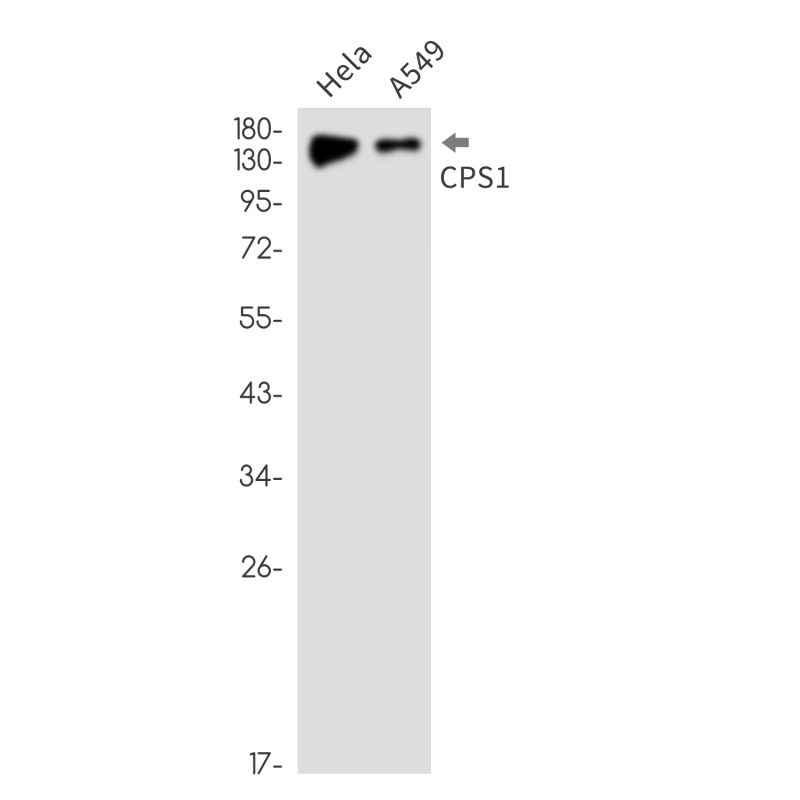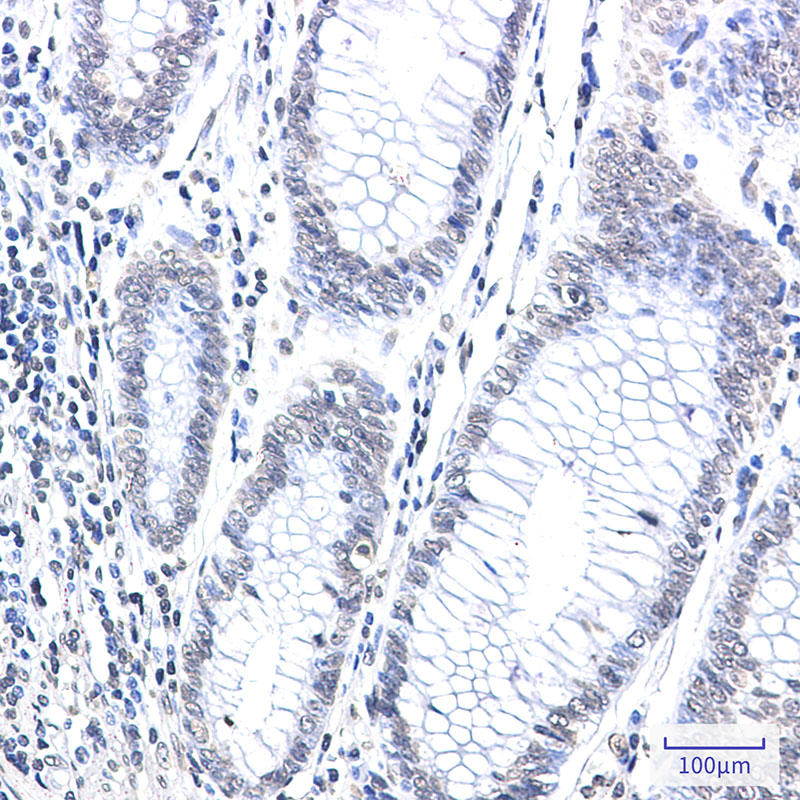

| WB | 1/500-1/1000 | Human,Mouse,Rat |
| IF | 1/20 | Human,Mouse,Rat |
| IHC | 1/50-1/100 | Human,Mouse,Rat |
| ICC | 技术咨询 | Human,Mouse,Rat |
| FCM | 咨询技术 | Human,Mouse,Rat |
| Elisa | 咨询技术 | Human,Mouse,Rat |
| Aliases | Cps1; CPSase 1; CPSase I; CPSASE1; MS738 |
| Entrez GeneID | 1373 |
| WB Predicted band size | Calculated MW: 165 kDa; Observed MW: 160 kDa |
| Host/Isotype | Rabbit IgG |
| Antibody Type | Primary antibody |
| Storage | Store at 4°C short term. Aliquot and store at -20°C long term. Avoid freeze/thaw cycles. |
| Species Reactivity | Human |
| Immunogen | A synthetic peptide of human CPS1 |
| Formulation | Purified antibody in TBS with 0.05% sodium azide,0.05%BSA and 50% glycerol. |
+ +
以下是关于CPS1抗体的模拟参考文献示例(仅供学术参考,建议通过PubMed或Google Scholar验证真实文献):
1. **标题**:*Carbamoyl Phosphate Synthetase 1 (CPS1) as a Diagnostic Marker for Hepatocellular Carcinoma*
**作者**:Smith A, et al.
**摘要**:本研究通过免疫组化分析,验证CPS1抗体在区分肝细胞癌(HCC)与其他肝脏肿瘤中的特异性,发现CPS1在HCC中高表达,可作为潜在诊断标志物。
2. **标题**:*Mitochondrial Enzyme CPS1 Expression in Metabolic Disorders: An Antibody-Based Study*
**作者**:Lee B, et al.
**摘要**:利用CPS1抗体检测尿素循环障碍患者的肝组织样本,发现CPS1蛋白表达水平显著降低,提示其与先天性代谢缺陷的相关性。
3. **标题**:*Validation of a Novel Monoclonal Antibody for CPS1 in Human and Mouse Tissues*
**作者**:Garcia R, et al.
**摘要**:报道一种高特异性CPS1单克隆抗体的开发,并通过Western blot和免疫荧光验证其在人类和小鼠组织中线粒体定位的可靠性。
4. **标题**:*CPS1 as a Marker for Hepatic Progenitor Cells in Liver Regeneration*
**作者**:Chen X, et al.
**摘要**:研究通过CPS1抗体标记肝前体细胞,揭示其在肝再生过程中的动态表达,为肝损伤修复机制提供新见解。
**注意**:以上文献为示例性质,实际引用请查询权威数据库(如PubMed)获取真实发表的研究。
The CPS1 (Carbamoyl Phosphate Synthetase 1) antibody is a tool used to detect and study CPS1. a mitochondrial enzyme critical to the urea cycle and arginine biosynthesis. CPS1 catalyzes the first step of the urea cycle, converting ammonia and bicarbonate into carbamoyl phosphate, a process vital for detoxifying ammonia—a byproduct of protein metabolism. Deficiencies in CPS1 function cause hyperammonemia, a life-threatening metabolic disorder characterized by neurological impairment and liver dysfunction.
CPS1 is primarily expressed in the liver and intestinal mucosa, making its antibody particularly relevant for research on hepatic diseases, urea cycle disorders, and mitochondrial function. The antibody is widely employed in techniques like Western blotting, immunohistochemistry, and immunofluorescence to assess CPS1 expression levels, localization, and potential mutations. Recent studies also explore its role beyond metabolic regulation, including associations with cancer progression (e.g., hepatocellular carcinoma), drug resistance, and metabolic syndromes.
Additionally, CPS1 antibodies aid in diagnostics, enabling the identification of CPS1 deficiency in patients through tissue or cell-based assays. Emerging research suggests CPS1 may serve as a biomarker for certain cancers or metabolic conditions, highlighting its broader clinical relevance. Overall, the CPS1 antibody is indispensable for both basic research and translational studies targeting ammonia metabolism, genetic disorders, and mitochondrial pathophysiology.
×